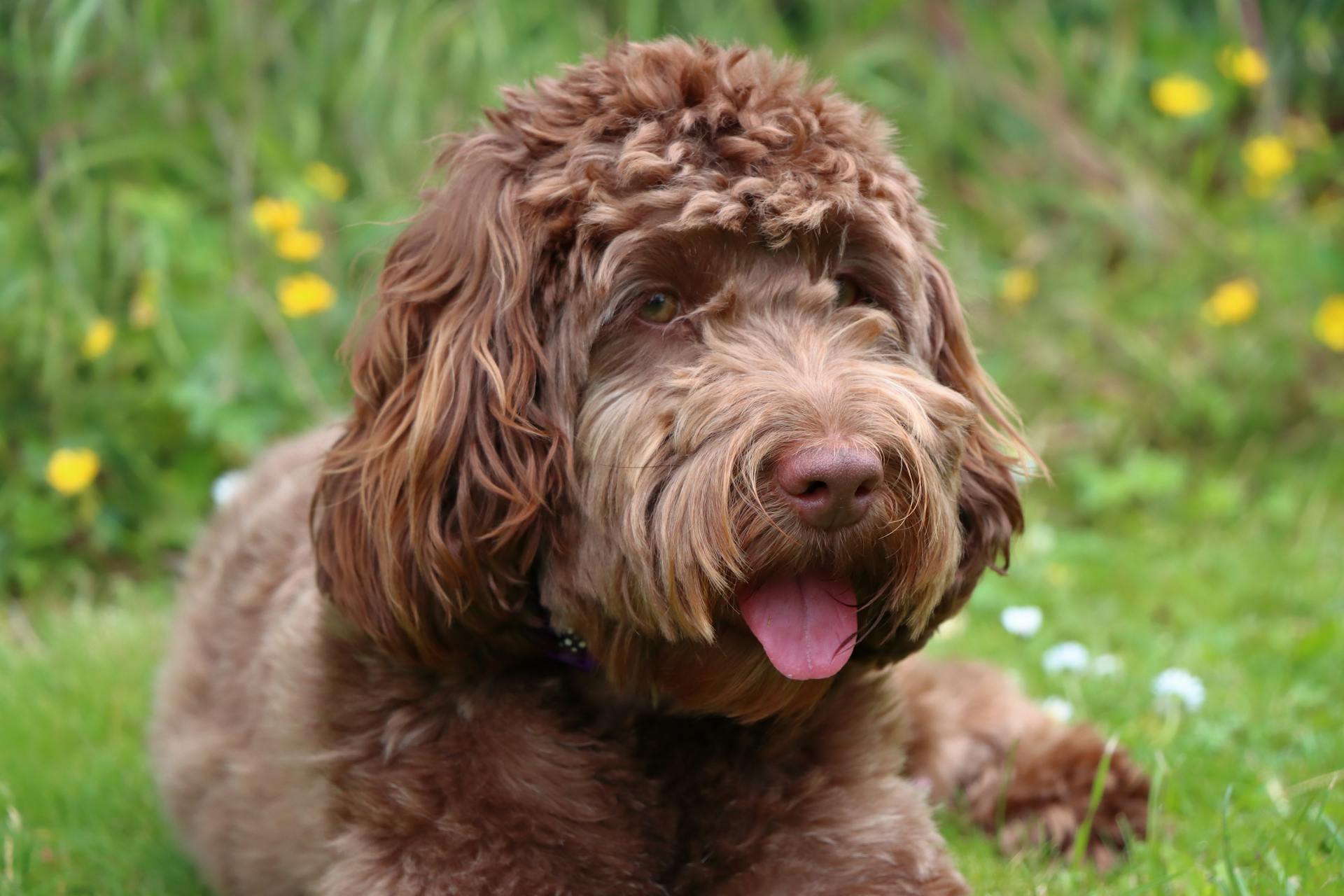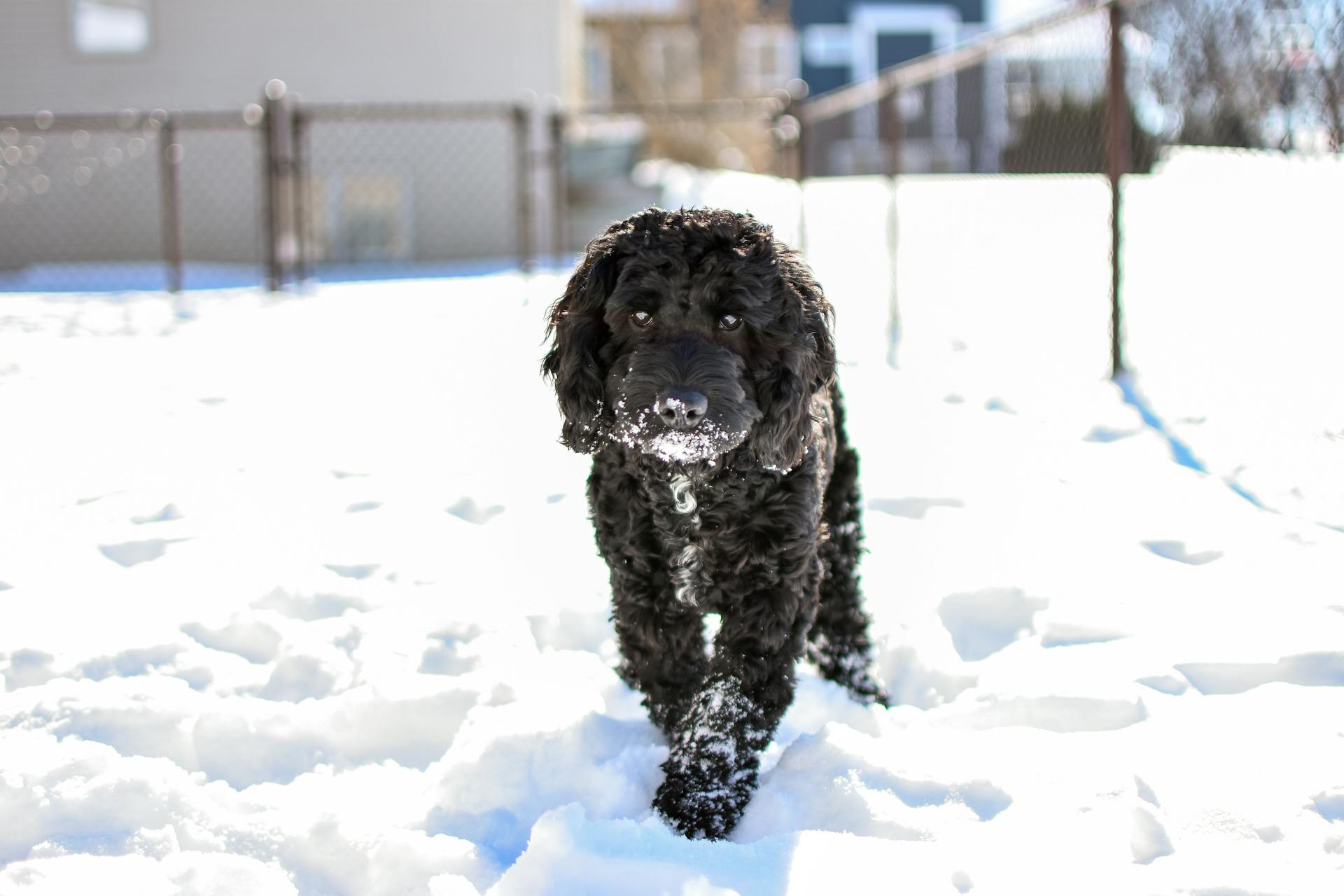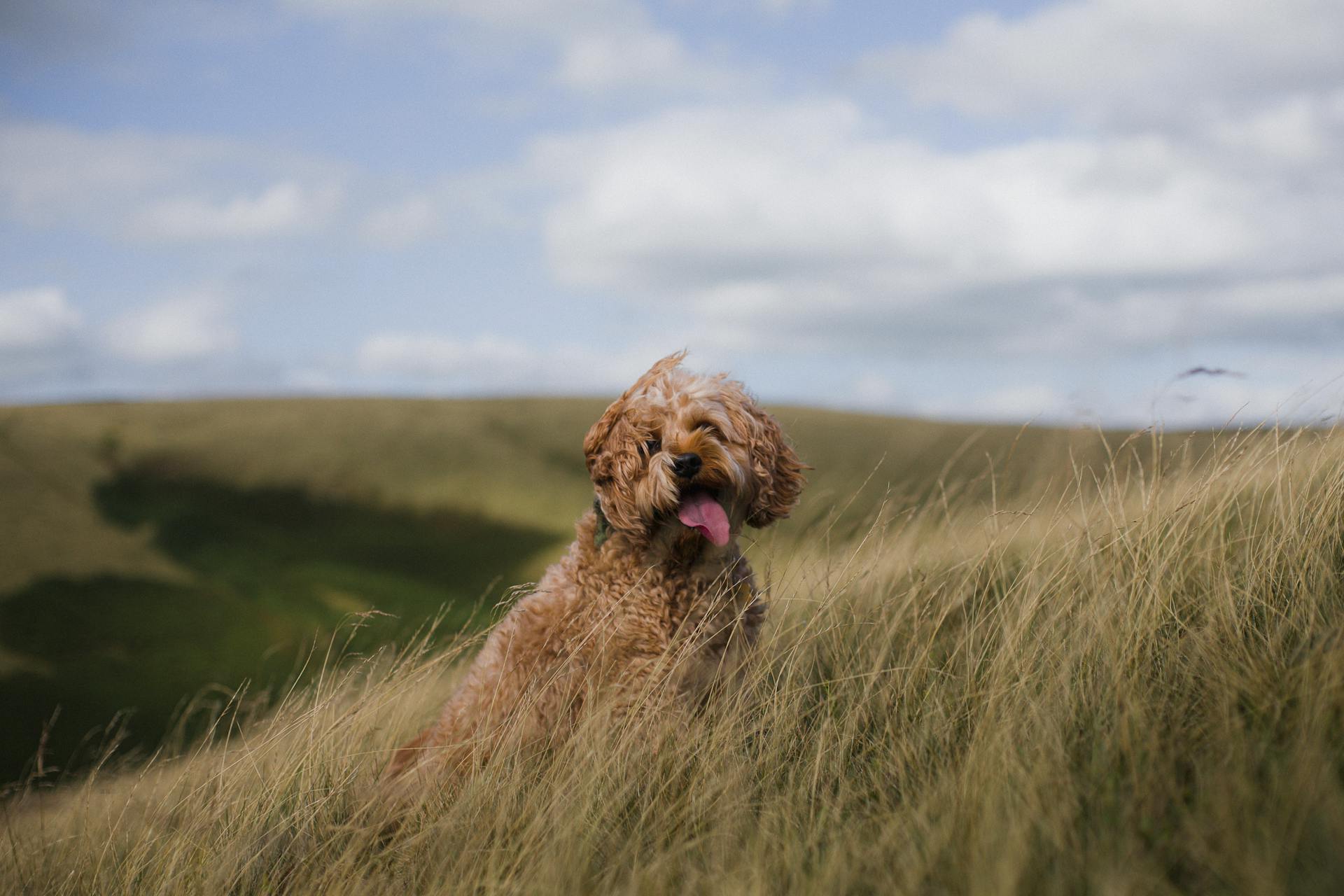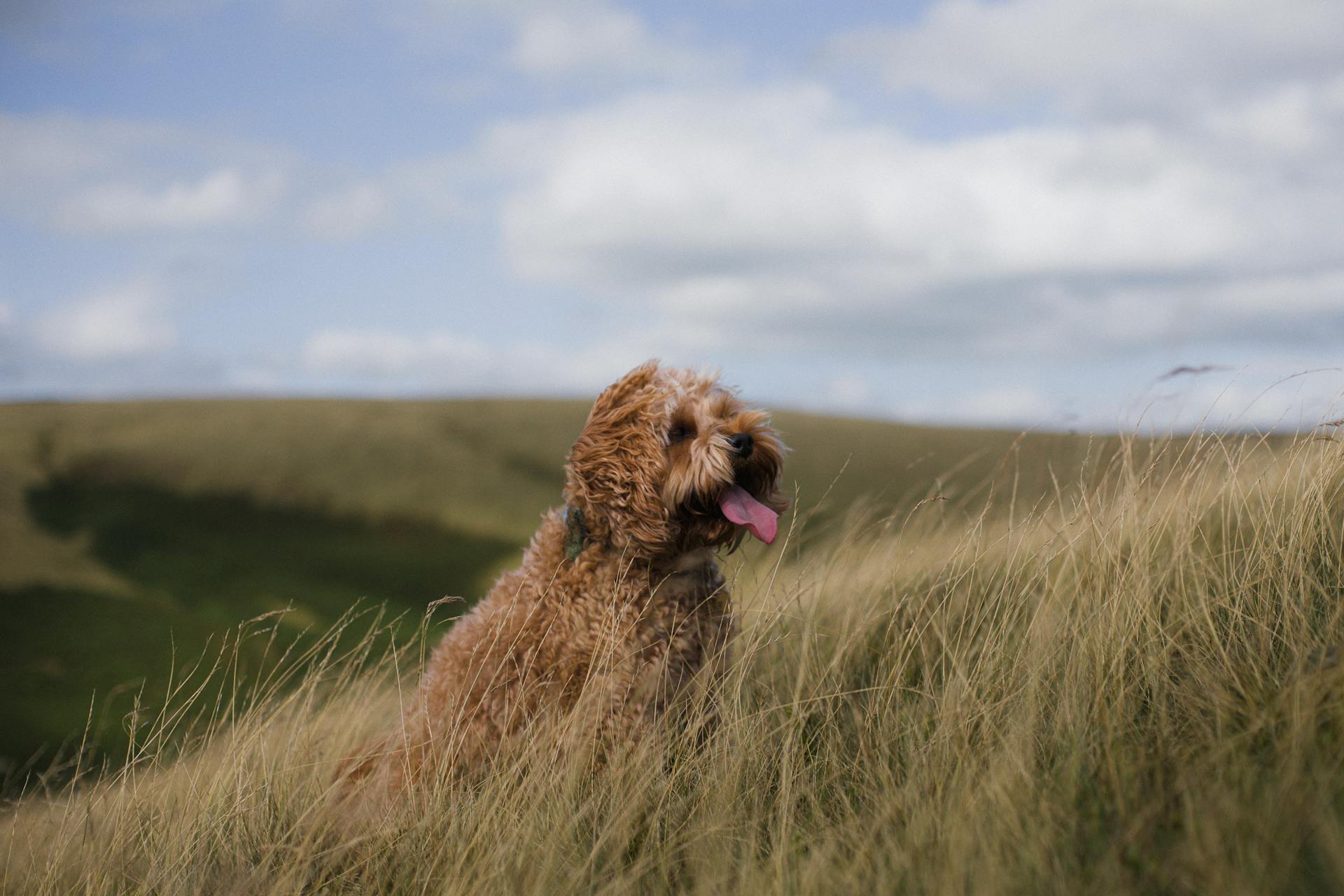
Training a Cockapoo requires patience, consistency, and positive reinforcement.
Cockapoos are intelligent dogs that thrive on interaction and mental stimulation, so it's essential to provide them with engaging activities and training sessions.
Housebreaking a Cockapoo can be challenging due to their small bladder size and tendency to be easily distracted.
Establishing a routine and using potty pads or newspaper in a designated area can help with this process.
Getting Started
Getting started with cockapoo training is crucial for a smooth transition from their first home to their forever one. It's essential to have a good handle on the best way to move forward with training from the beginning, as dogs need routine and like to know what is expected of them.
You can start training your cockapoo as early as 4-6 months, but even before this ideal age, your cockapoo is continuously learning from its surroundings and interactions. Positive reinforcement, consistency, and patience are key to successful training.
To get started, use rewards like treats and praise to encourage good behavior, and begin with basic commands like sit, stay, and come. Keep training sessions short and enjoyable to keep your pet engaged and eager to learn.
See what others are reading: Is Crate Training Good for Puppies
When to Get a Puppy
Getting a new puppy is an exciting time, but it's essential to consider when to bring them home. You can start training your Cockapoo puppy as early as 4-6 months.
Their cognitive abilities are fully developed by this age, making them more receptive to learning. However, it's also important to remember that they're continuously learning from their surroundings and interactions, even before this ideal age.
You can begin teaching your Cockapoo basic commands and etiquette as soon as they join your family, instilling positive behaviors from the start. This will lay the foundation for their future training.
If you're planning to socialize your Cockapoo or sign them up for group training classes, wait until they're at least 12 weeks old or fully vaccinated. This is crucial for their safety and the safety of other dogs.
Suitable for Beginners
If you're a first-time dog owner, you're in luck because Cockapoos make great pets for beginners. They're friendly, adaptable, and easy to get along with.

In fact, Cockapoos are generally easy to train due to their intelligence and eagerness to please. With the right approach, you can teach your Cockapoo basic commands like sit, stay, and come.
Training sessions should be short and enjoyable to keep your pet engaged and eager to learn. Positive reinforcement, such as treats and praise, is a great way to encourage good behavior.
You can start training your Cockapoo right from the time they enter your home. This way, they'll learn about acceptable behavior from the get-go. Be sure to chat with the breeder to find out what they've already been doing with your pup.
Here are some common behavioral issues that Cockapoos may exhibit, and how to address them:
- Chewing on furniture: Provide plenty of chew toys and rotate them regularly to keep your pup interested.
- Rolling in dirt and poop: Keep an eye on your pup during walks and reward them for good behavior.
- Swallowing socks and other objects: Supervise your pup closely and pick up any loose items.
- Persistently pulling on the leash: Practice loose-leash walking by rewarding your pup for staying by your side.
- Snatching food: Keep food out of reach and reward your pup for calm behavior around food.
Remember, consistency and patience are key when training a Cockapoo. With the right approach, you can help your pup become a well-behaved and loving companion.
Establishing a Routine
Establishing a routine is crucial when it comes to potty training your Cockapoo. Dogs thrive on predictability and structure, so creating a consistent schedule will help them understand when and where they should go to the bathroom.
Take your Cockapoo outside to the designated potty area at regular intervals throughout the day, such as after meals, naps, and play sessions.
Use a specific command, such as "Go potty", to signal to your dog that it's time to eliminate. When your Cockapoo does their business outside, reward them with praise, treats, or a favorite toy to reinforce the behavior.
Here's a breakdown of a daily routine to facilitate a smooth training journey for your Cockapoo:
Remember, consistency is key, and establishing a routine will help your Cockapoo adjust to their new lifestyle and understand when and where to do their business.
Best Age to Train a Dog
Establishing a routine for your dog is crucial, and it starts with training at the right age. You should get started with training your Cockapoo right from the time they enter your home.
It's essential to initiate socialization early, so your pup learns acceptable behavior from the get-go. Chat with the breeder to find out what they have already been doing with your pup.
Establishing a Routine

Establishing a routine is crucial when it comes to potty training your Cockapoo. Dogs thrive on predictability and structure, so creating a consistent schedule will help them understand when and where they should go to the bathroom.
A regular routine offers a sense of predictability, helping your Cockapoo adjust to their new lifestyle. It also helps schedule vital activities like feeding times, bathroom breaks, naps, exercise, playtime, and bonding sessions with you.
To establish a routine, start by taking your Cockapoo outside to the designated potty area at regular intervals throughout the day, such as after meals, naps, and play sessions. Use a specific command, like "Go potty", to signal to your dog that it's time to eliminate.
Here are some tips to help you establish a routine:
- Take your Cockapoo outside to the designated potty area at regular intervals.
- Use a specific command, like "Go potty", to signal to your dog that it's time to eliminate.
- Reward your Cockapoo with praise, treats, or a favorite toy when they do their business outside.
- Keep a watch on feeding frequency, which should be aligned with your Cockapoo's age.
A consistent routine also helps you keep track of your Cockapoo's needs and schedule training sessions accordingly. For example, you can use the following schedule:
- Morning: Wake up, potty break, breakfast
- Afternoon: Nap time, potty break
- Evening: Dinner, potty break, playtime
- Before bed: Potty break, calm time
Remember, consistency is key when it comes to training your Cockapoo. Stick to your routine and adjust as needed to ensure a smooth training journey for your furry companion.
Training Methods
Cockapoos are known to be intelligent and eager to please, making them relatively easy to train. They thrive on positive reinforcement, which focuses on rewarding desired behavior rather than punishing unwanted actions.
One effective training method is positive reinforcement, which involves giving your Cockapoo a treat or praise when they display the desired behavior. This encourages them to repeat the action, creating a positive association with the behavior.
Clicker training is a popular positive reinforcement method that uses a small handheld device called a clicker to mark the precise moment when your Cockapoo performs the desired behavior, followed by a reward. This technique helps communicate to your dog exactly what they've done right.
Reward-based training relies on the principle of positive reinforcement to shape your Cockapoo's behavior, using high-value treats and consistent rewards to expedite the learning process.
Reward-Based
Reward-based training relies on the principle of positive reinforcement to shape your Cockapoo's behavior. This method is essential for successful training, especially for first-time owners.
You can encourage good behavior and build a strong bond with your furry friend by using reward-based training. Positive reinforcement techniques focus on rewarding desired behavior instead of punishing unwanted actions.
Rewarding your Cockapoo with treats, praise, or playtime creates a positive association with the action, motivating them to repeat it. Using high-value treats and consistent rewards can expedite the learning process.
Reward-based training is an effective approach for training your playful Cockapoo, and it's a great way to communicate what they've done right. Consistent use of this method can lead to quick and reliable responses from your furry companion.
Rewarding your Cockapoo at the precise moment they perform the desired behavior is key, which is why clicker training is often used in conjunction with reward-based training. This helps your dog understand exactly what they've done right and makes the learning process clearer and more efficient.
Rewarding your Cockapoo with a treat or praise immediately after they display the desired behavior is crucial. This creates a positive association with the action and motivates them to repeat it.
Reward-based training is a great way to encourage good behavior and build a strong bond with your Cockapoo. It's an effective approach that can lead to quick and reliable responses from your furry companion.
Mirror
Mirror training is a powerful technique that helps you build a strong relationship with your dog by encouraging them to mimic your actions. This method takes ideas from positive reinforcement and clicker methods and builds on them.
The key idea of mirror training is that your dog sees you as a leader or parent figure, and they look up to you for guidance. This means you need to be aware of your own behavior and make sure it's not sending mixed signals to your pet.
If your dog is doing something you don't want them to do, it's essential to look to yourself and figure out what you're doing wrong. This might involve issues of miscommunication, going against your dog's instincts, or not having enough "respect points" with your pup.
For example, if you have an overactive hound, you need to find ways to keep them busy and engaged. This could be as simple as providing them with plenty of opportunities to exercise and play.
Providing your dog with opportunities to live like a dog is crucial to shaping their behavior. This includes activities like hunting, swimming, and working, which are all natural behaviors for dogs. Playing games with your dog and practicing canine sports that emulate these behaviors are vital to their development.
Suggestion: How to Train a Ferret Not to Bite?
Socialization and Exposure
Socialization and exposure are crucial aspects of Cockapoo training. Socialization should start early, introducing your puppy to a wide range of people, including children, and allowing safe interactions with other pets.
Ensure your pup is fully vaccinated and has been given the go-ahead by a vet before bringing them into communal areas like dog parks. This will help prevent the risk of illness and ensure a smooth socialization experience.
The benefits of socializing your Cockapoo are threefold. It helps your pup become comfortable with various individuals and animals, promoting appropriate social behavior. Socialization also builds confidence in your Cockapoo, lessening potential anxiety in unfamiliar circumstances.
Cockapoos, being naturally sociable, enjoy interacting with others and thrive in social environments. This makes socialization a vital part of their training.
To expose your Cockapoo to different environments, take them to parks, busy streets, and pet-friendly stores. Organize playdates with other vaccinated dogs to encourage positive social interaction.
Here are some specific activities to help your Cockapoo become well-adjusted and confident:
- Take your Cockapoo to parks, busy streets, and pet-friendly stores.
- Organize playdates with other vaccinated dogs to encourage positive social interaction.
- Gradually acclimate the puppy to car rides, public transport, and grooming salons.
By following these tips, you can help your Cockapoo become a well-rounded and well-behaved pet.
Developing Proper Habits
Developing proper habits is essential for successful cockapoo training. Establish a regular routine to take your puppy outdoors consistently, especially after meal times, naps, and play sessions.
Use specific commands like "go potty" to create an association between the phrase and the activity. This will help your puppy learn what's expected of them. Consistency is key, so try to take your puppy out at the same times every day.
Reward your puppy with treats or praise when they successfully go outside. This positive reinforcement will encourage good behavior and help them learn faster. Treats can be especially effective in the early stages of training.
As you establish a routine, be patient and remember that accidents will happen. Don't scold or punish your puppy for mistakes – it's all part of the learning process. With time and consistency, your puppy will learn to go potty outside where they belong.
Here's a quick rundown of when to take your puppy outside:
Behavioral Issues and Solutions
Cockapoos are known to be energetic and expressive, which can sometimes lead to excessive barking. This can be managed by training them to respond to a "quiet" command or by redirecting their focus elsewhere.
Avoid raising your voice or displaying anger, as this may escalate the behavior. Instead, be calm and patient when addressing excessive barking.
Separation anxiety is another common issue in Cockapoos, especially if they're left alone for extended periods. Gradually increasing their alone time, offering stimulating toys, and maintaining a calm demeanor when leaving and returning home can help mitigate this issue.
Stubbornness can also be a challenge during training, but ensuring that training sessions are enjoyable, concise, and filled with rewards can keep them engaged.
Potty training challenges are not uncommon in Cockapoos, but consistent training, patience, and a routine bathroom schedule can significantly assist in this process.
Here are some common behavioral issues in Cockapoos and their solutions:
Remember, tackling each issue with patience and empathy is essential to ensure your Cockapoo feels secure and cherished throughout their training journey.
Training Tools and Essentials
To make cockapoo training a breeze, you'll need some essential tools and equipment. A simple yet sturdy nylon dog leash is a good starting point, as your dog will likely chew on it in the early days.
For walking training, you'll also need a suitable harness to go with your leash. Don't forget to pick up a collar to attach your pet's information tags to, just in case they manage to slip out of their harness.
Some basic training is a must for any dog, including your cockapoo. This includes toilet training, which is recommended from a young age, unless your dog exclusively lives outside.
Consider reading: Leash Training a Rescue Dog
Essential Items
You'll need a treat pouch to keep a plentiful supply of high-value treats on hand, as food is usually the most effective motivating tool for a Doodle.
High-value treats should be super tasty, but be mindful of the calories, especially for older pups that can quickly gain weight if they're not careful.
Discover more: Dog Training without Treats

A simple yet sturdy nylon dog leash is all you need for walking training, and it's best to hold off on fancy options in the early days when your dog will likely chew on both the leash and harness.
A suitable harness and collar to attach your pet's information tags to in case they get loose are also essential items to pick up.
Toys can be a great alternative to treats, especially for pups that aren't motivated by food, and they work well with the clicker method.
Pet Enclosures
Pet enclosures are a must-have for any dog owner. They help limit your dog's freedom to specific areas of the house, making accidents easier to clean up.
Pet gates and playpens are great tools for creating these enclosures. Many owners use them to restrict their dog's access to certain rooms or areas.
Crate training is also a popular option for some owners. It creates a safe space for your dog and makes moving them about easier.
Limiting your dog's freedom can be beneficial, especially during the early stages of toilet training. It makes accidents easier to deal with, and your dog will learn to associate certain areas with their needs.
Training Programs and Guides
Training your Cockapoo can be a fun and rewarding experience for both you and your furry friend. Cockapoos are known to be highly intelligent and eager to please, making them relatively easy to train.
Intensive training programs like board and train programs can be an excellent option for pet owners who need guidance and support. These programs typically involve a professional trainer working with your Cockapoo for several weeks, providing daily training and socialization.
However, some pet owners may find it challenging to part with their Cockapoo for an extended period, which can lead to anxiety. If you're considering a board and train program, be sure to weigh the benefits against the potential drawbacks.
For those who prefer a more hands-on approach, there are various training techniques and methods available. The four popular methods include positive reinforcement, clicker training, agility training, and obedience training.
Cockapoos are known to thrive in training environments that focus on positive reinforcement and reward-based learning. This approach encourages good behavior and helps to build a strong bond between you and your Cockapoo.
If you're new to dog training or struggling to find the right approach, consider investing in a comprehensive training guide like Cockapoo 101: Owner's Guide. This digital guide offers a wealth of information on training techniques, troubleshooting behavioral problems, and understanding your Cockapoo's body language.
Here are some key topics covered in Cockapoo 101: Owner's Guide:
- Where to adopt your pup and how to find reputable breeders
- First steps to take before and after bringing your Cockapoo home
- House-training, handling accidents, and regression
- Proper nutrition and exercise to keep your puppy happy and healthy
- Key training principles and techniques for accelerated progress
- Skills and tricks every dog and dog owner should know
- Understanding your Cockapoo's body language, facial expressions, and vocals
- The most effective way to obedience train a stubborn Cockapoo
- Troubleshooting existing behavioral problems
This guide is an excellent resource for pet owners who want to ensure their Cockapoo receives the best possible training and care.
Frequently Asked Questions
How do you discipline a cockapoo?
Disciplining a Cockapoo involves using positive reinforcement, such as treats and praise, to encourage good behavior rather than punishment. Rewarding good behavior helps build trust and strengthens your bond with your Cockapoo.
Are Cockapoos hard to potty train?
Cockapoos are relatively easy to potty train due to their intelligence. With proper training, they can learn to go potty quickly and efficiently.
What age do Cockapoos calm down?
Cockapoos typically calm down around 2 years old, with a noticeable slowdown at around 7 years old as they transition into a less active phase of life.
How do you start training a Cockapoo?
Begin house training immediately and focus on positive reinforcement, praising calm behavior and rewarding good habits
What are the behavior problems with Cockapoos?
Cockapoos can exhibit behavior problems such as excessive barking and destructive chewing due to separation anxiety. If left alone for extended periods, they may display signs of distress, making proper training and care essential.
Featured Images: pexels.com